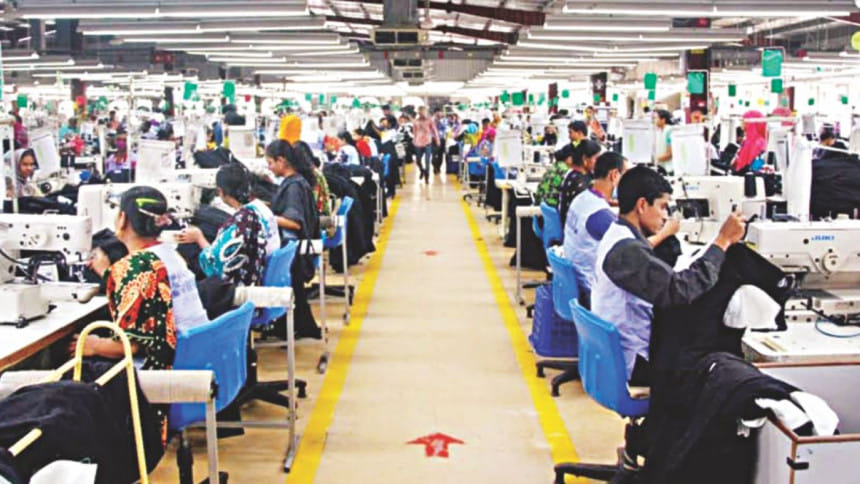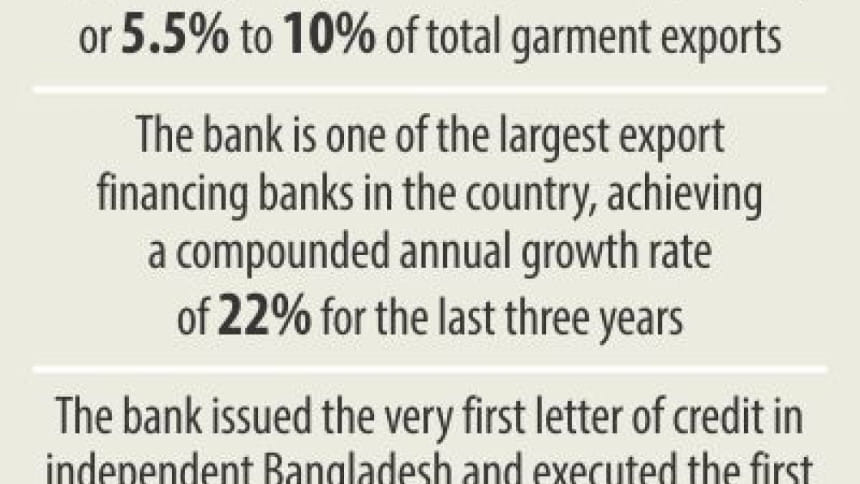Standard Chartered: Standing beside the private sector

Standard Chartered Bank's history in Bangladesh dates back to 1905. For 112 years the bank remained open for business and stood a proud witness to the innate resilience of this country that has continued to drive economic growth and progress. This progress could not be contained by the sweeping geopolitical shifts that changed the landscape of this region, the wars, and natural calamities. Time and again Bangladesh has shown the vitality, dynamism and energy to remain unwavering on the path of economic growth and social development.
After attaining independence in 1971, the country inherited a war-torn economy that had suffered many years of neglect. There was a pressing need to revitalise international trade and commerce for importing essential commodities, and to reorganise the banking structure to gain international recognition.
At this historical point of the country's metamorphosis to an independent nation, Standard Chartered, the nation's oldest financial institution, achieved the first of many milestones that mark its unique relationship with sovereign Bangladesh.
"At that time, Standard Chartered issued the sovereign country's first letter of credit. This was a very important achievement – a testament to the bank's unwavering commitment to facilitate trade and commerce for Bangladesh, and stand beside Bangladesh's businesses, which continue to play a critical role in catalysing the nation's economic development," said Abrar A Anwar, chief executive officer of Standard Chartered Bangladesh. "To this day, Standard Chartered retains its core belief in the strong fundamentals underlying Bangladesh's economy, and the resilience and strength of its people that is driving our nation forward," he added.
Since independence, Bangladesh's growth story has been remarkable. The commendable success in the Millennium Development Goals highlights the country's achievements in the social sphere. This success has been underpinned by the growth momentum of the nation's economy, forecast to become the 23rd largest in the world by 2050. Bangladesh has been identified as one of the 11 countries with the highest growth potential leading up to 2050, and one of the highly potential "Frontier Five" economies.

One of the major protagonists of this success story has been the nation's flourishing industries, led by the achievements of the readymade garments sector. In 2016, the sector accounted for 5.1 percent of a global trade worth $503 billion. Bangladesh remains the second largest RMG exporter to the world. The industry spearheads the nation's exports, accounting for around 80 percent of our export earnings while creating four million jobs. Standard Chartered itself has been a humble part of this story. Between 2011 and 2016, the bank's share in RMG exports grew from US$1.1 billion to US$2.64 billion, or 5.5 percent to 10 percent of total RMG exports, keeping pace with the rapid growth of the industry. The bank aspires to facilitate a greater volume of the RMG trade as part of its commitment to the growth story of RMG.
Facilitating international trade for its partners has been an historical strength for the bank. This continues to be the case today, with the bank directly and indirectly handling 13 percent of the country's trade. Standard Chartered is the largest trade processing hub in Bangladesh, boasting of the country's largest trade assets and contingent books. It is one of the largest export financing banks in the country, achieving a compounded annual growth rate of 22 percent for the last three years.
To help Bangladesh's businesses compete on the global stage, the bank has introduced a number of innovative trade financing products in recent years. This include, commercialised avalisation-based import financing solution and commercialised foreign currency-based export financing. The bank is also the first to have launched 'Duty Financing', through which corporate clients can avail trade loans to pay various types of duties, taxes, levies or regulatory payments associated with their purchase or sales. The bank's structured finance solutions have helped refinance the client's balance sheet by tagging term finance repayments directly with export contracts and easing reliance on short-term financing for longer term investments. The bank executed the first structured finance transaction in the country and has been an industry leader in arranging innovative funding structures for its clients. Standard Chartered has also been closely involved in infrastructure development in Bangladesh arranging funding for well-known landmarks. The bank has recently showcased the capacity to act as mandated lead arranger for preference share issuance of corporates.
Standard Chartered Bangladesh has also been an active player in Islamic banking, helping widen access to Shariah-compliant financial products and services for businesses in Bangladesh. The bank offers a full suite of Islamic cash management, working capital and financing solutions for its corporate banking clients. In 2016, Standard Chartered issued the first ever Shariah compliant $32 million Diminishing Musharaka Islamic Syndication facility, supporting the client's export growth. The deal was recognised by Islamic Finance News (IFN) as "Best Islamic Deal - Bangladesh" in 2016.
The bank further supports its clients' businesses through a unique supply chain management solution. The supply chain product aims to help businesses build the capacity across the supply chain network (i.e. suppliers and distributors). Standard Chartered supports the supply chain partners to develop their capacity with a view to increasing their access to finance and growth capital. This proposition allows the bank to grow the sourcing and distribution competitive advantage of the clients by strategically supporting both upstream and downstream supply chain network.
The bank sees tremendous potential for growth in sectors such as pharmaceuticals, commercial real estate, retail channels, and aviation. In the pharmaceuticals space, it commands a market-share of approximately 10 percent. With strong domestic demands and ever growing export potential, the pharmaceutical sector is set to be a major growth engine of the economy. The nation's aviation sector is also steadily moving forward, and in this too the bank has been a proud partner. In addition to financing the fleet of the national carrier, it has also completed the first aircraft lease rental transaction by a commercial bank, where a fully-owned subsidiary of Standard Chartered leased a Boeing 737-800 to a local client.
A central pillar of Standard Chartered's commitment to be a partner in progress to the nation is to help businesses operate sustainably, both from an environmental and social perspective. The bank actively engages its partners operating in industries that have potential environmental or social externalities, and help migrate best practices with the help of its global network. Its credit approval policy allows it to take on only those opportunities that have been deemed fit by its Environmental and Social Risk Assessment framework. The requirements of the framework are comprehensive, and the bank works with external consultants to advise and guide its clients to meet these standards.
On its commitment to help Bangladesh's business grow, Enamul Huque, managing director & head of commercial banking of Standard Chartered Bangladesh, said "We are proud to be able to stand beside Bangladesh's entrepreneurs, who play a critical role in taking our nation forward. We remain fully committed to supporting Bangladesh's businesses at our full capacity. We will keep up our endeavour to bring to bear the strength of our global network, know-how, and knowledge of the local market gained over 112 years, in helping Bangladesh's businesses thrive."
The banking sector features prominently in the growth stories of national economies. International banks such as Standard Chartered, with their unique ability to mobilise offshore capital and to facilitate global trade and investment -- both of which are critical to sustained growth, have a significant role to play in this story. It has been the proud heritage of Standard Chartered to be a partner in progress of Bangladesh, and it is fully committed to continuing that role in the next chapter of Bangladesh's story.

 For all latest news, follow The Daily Star's Google News channel.
For all latest news, follow The Daily Star's Google News channel. 



Comments